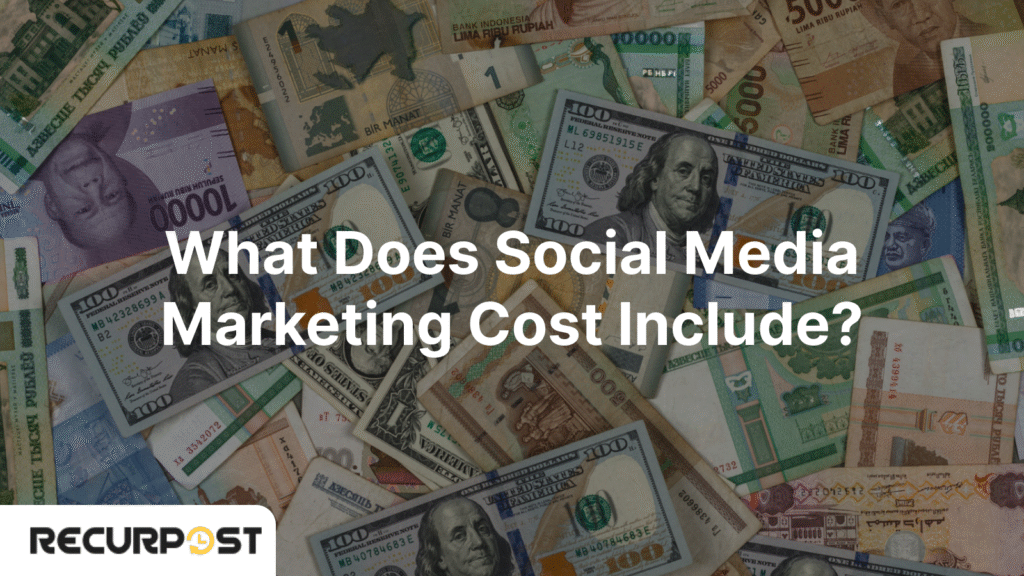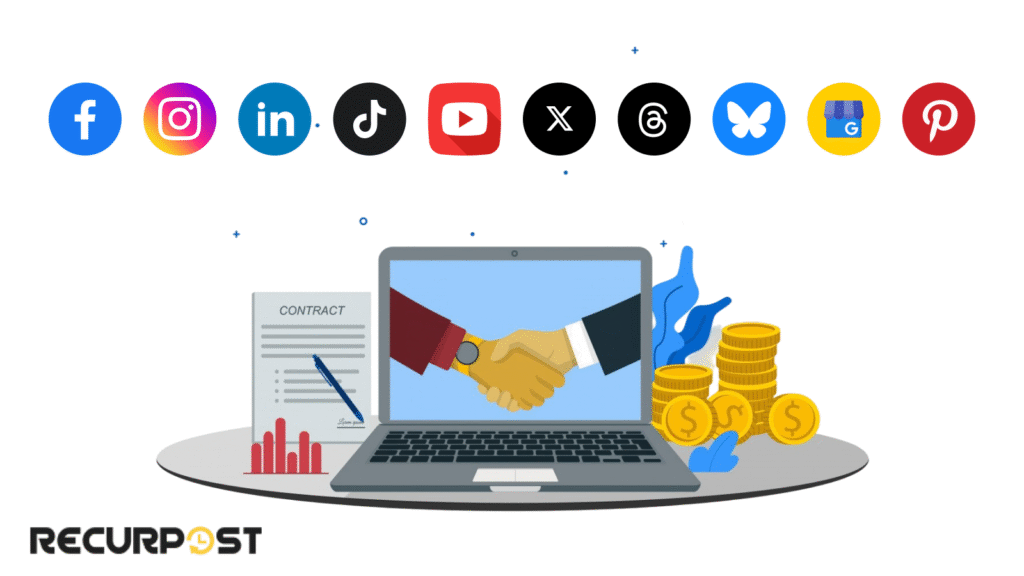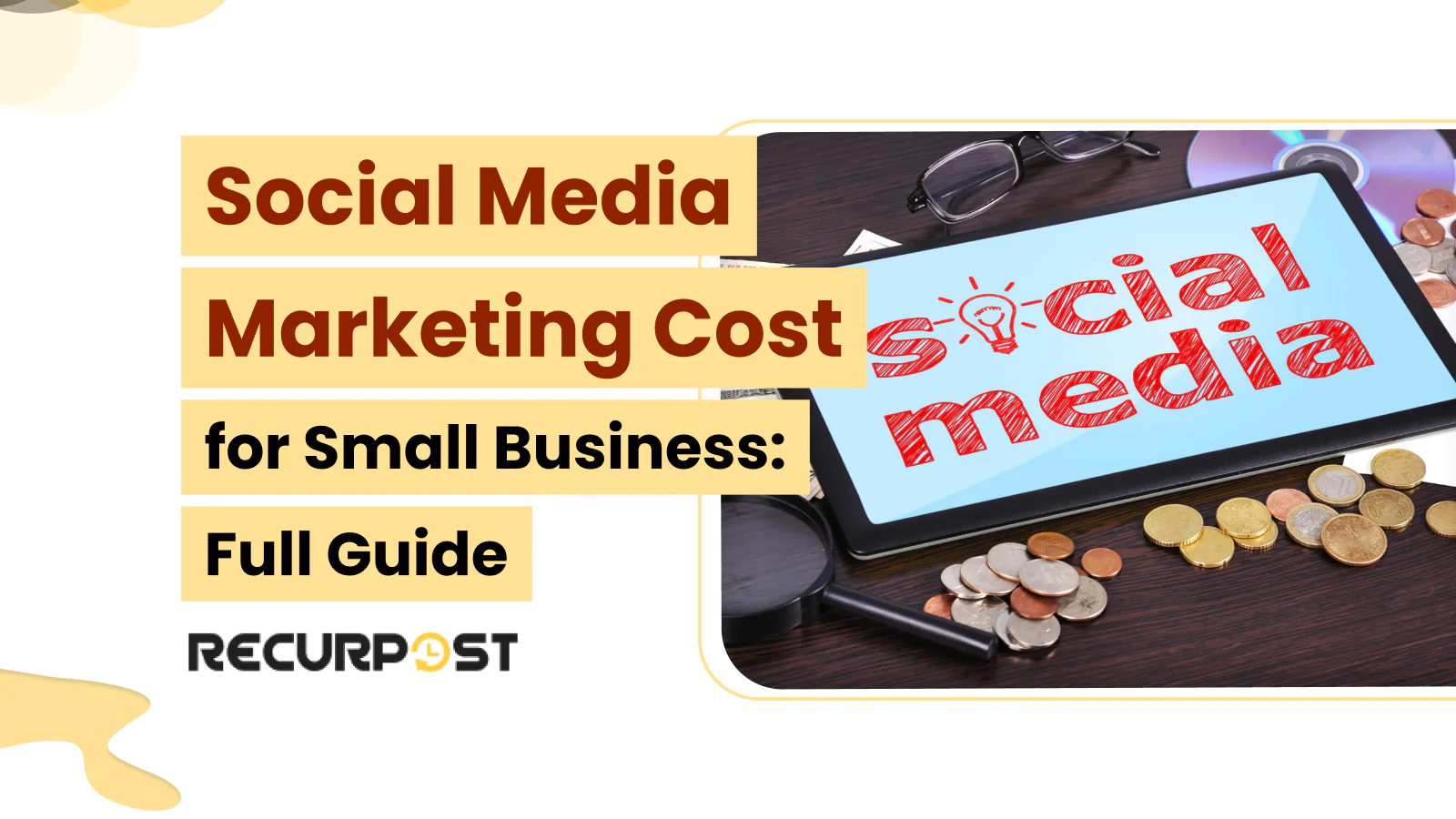Social media marketing services typically cost between $500 to $5,000 per month for most businesses, while social media marketing cost directly shapes how brands connect, grow, and compete online. Most businesses spend between $500 to $10,000+ monthly on social media marketing, depending on company size and goals.
From running paid ad campaigns to managing social media accounts across multiple platforms, every decision impacts your bottom line. Whether you’re a small business owner, a startup founder, or working with a social media agency, knowing how much to spend and where is key to staying competitive.
Social media marketing packages typically range from $1,000 to $5,000 per month for professional management services.
As social media networks evolve, so do advertising costs, bidding strategies, and the price of social media services like content creation, community management, and targeted campaigns. Your marketing budget isn’t just fueling social media ads; it’s shaping your digital marketing strategy, boosting website traffic, and influencing how well you reach your target market.
Social media marketing pricing knowledge enables businesses to make strategic investments, attract target audiences, and align marketing campaigns with business objectives.
What Does Social Media Marketing Cost Include?

There is no denying that social media is important for businesses. Running strong social media campaigns means spending on more than just social media ads. Building a social media presence or managing multiple accounts involves costs across numerous components. Businesses often invest in content creation, paid advertising, community management, and social media management software to stay visible and active.
Social media management pricing structures range from hourly rates ($20-$100 per hour) to monthly retainers ($500-$10,000+ depending on scope), where a typical social media marketing package from a social media agency or service provider may include post design, copywriting, platform scheduling, influencer partnerships, and customer engagement, all contributing to your monthly ad spend.
Basic packages start at $500-$1,500 monthly, while comprehensive packages can reach $3,000-$10,000+, depending on the number of platforms and services included.
Social media advertising campaigns typically cost $5-$25 per click and $25-$200 per lead across platforms, where the ad budget is shaped by your bidding strategy, ad format, and target audience.
Social media agencies charge between $2,000-$10,000+ monthly for comprehensive services, depending on business size and scope. Social media marketing costs, whether managed in-house or through an agency, include both fixed and variable expenses.
That includes social media management pricing, advertising costs, and the time spent aligning each piece with your broader digital marketing and business objectives.
Is Social Media Marketing Worth the Cost?
Likes are free. Results aren’t.
Every dollar spent on social media ads must generate measurable returns.
When ad budgets fail to drive clicks, save time, or generate leads, they waste resources.
Effective spending converts content into sales.
Ineffective spending creates noise.
Strategic posting and clear spending goals deliver ROI.
What Impacts Your Social Media Marketing Cost?
Social media marketing costs vary by business. Total expenses depend on platform selection, audience targeting, and campaign execution methods. Every post, ad, and tool decision plays a part in shaping what you actually spend.
Here’s what can raise or lower your cost across multiple social media platforms:
- Platform selection: Advertising on LinkedIn or YouTube may cost more than Facebook or Twitter, depending on your target market and niche.
- Ad format: Video ads, stories, carousels, and influencer content carry different advertising costs.
- Audience targeting: The broader or more competitive your target audience, the higher your ad budget may stretch.
- Bidding strategy: Manual bids, cost caps, and audience size affect how much you pay per result.
- Content creation: High-end visuals, branded videos, and creator partnerships push content creation costs up.
- Social media management setup: Whether you use a social media marketing agency, build an internal team, or subscribe to management software, the cost structure shifts.
- Number of platforms managed: Handling multiple social media channels increases both time and social media management costs.
- Community management: Replying to DMs, comments, and managing your social media presence requires time or staff investment.
- Campaign duration and volume: Running ongoing paid ad campaigns or frequent social media posts increases both spend and maintenance.
Platform-by-Platform Cost Breakdown

Social media marketing cost isn’t a flat rate; it shifts depending on the platforms you use, your target audience, and your paid ad campaigns. Each platform offers different formats, pricing models, and ad placements, which means your ad budget needs to be tailored based on where you show up and what you expect in return.
In 2025, brands allocated over $107 billion to digital channels, with social media advertising costs rising sharply across Facebook, Instagram, and YouTube.
Here’s what businesses spend across today’s top social media platforms:
Best For: Small businesses, real estate, restaurants, and e-commerce brands
- Average CPC: $0.94
- Average CPM: $12
- Best Use: Local campaigns, product ads, and retargeting
- Why It Matters: Facebook offers flexible campaign types for all industries. Whether you’re promoting a service or building brand recognition, the platform gives you tools to manage your spend.
- Cost Drivers: Ad relevance, bidding style, content quality, and audience size
Facebook advertising prices start at $0.94 per click and $12 per thousand impressions. Facebook marketing features are included in agency packages, particularly for community management and lead generation.
Best For: Fashion, beauty, wellness, lifestyle products, creators
- Average CPC: $0.60–$1.20
- Average Reels CPM: $6–$15
- Best Use: Visual branding, product launches, short-form video
- Why It Matters: With creative placements like Stories and Reels, Instagram gives brands rich media formats that drive website traffic and boost engagement.
- Influencer marketing is common here, with creator fees ranging from $100 to $10,000+ per post, depending on reach.
Instagram delivers results for fashion, beauty, fitness, food, and DTC products with visual content.
Best For: SaaS, recruitment, financial services, enterprise B2B
- Average CPC: $6–$9
- Sponsored InMail: $0.80–$1.20 per send
- Best Use: B2B outreach, hiring campaigns, event promotions
- Why It Matters: It’s expensive compared to other social media channels, but it delivers high-intent clicks, great for social media marketing services targeting professionals or high-ticket offerings.
LinkedIn forms a core platform for consultants, SaaS companies, and recruiters’ paid advertising strategies.
TikTok
Best For: Gen Z audiences, entertainment, DIY, food, and ecommerce
- Average CPM: $10–$30
- Creator Partnerships: $250–$20,000 per video
- Best Use: Story-driven content, entertainment, trending challenges
- Why It Matters: TikTok ads are immersive, creative, and designed for discovery. Your marketing cost depends on video quality, trend usage, and influencer tie-ins.
Multi-platform strategies frequently combine TikTok with Instagram and YouTube to maximize audience reach.
YouTube
Best For: Education, tech, SaaS, automotive, B2B, lifestyle tutorials
- Cost Per View: $0.10–$0.30
- Bumper Ad CPM: $5–$15
- Best Use: Long-form videos, product demos, expert content
- Best For: Education, tech, SaaS, automotive, B2B, lifestyle tutorials
- Why It Matters: YouTube works as both a social media network and a search engine, making it ideal for sustained brand awareness and content creation.
Brands with larger monthly budgets use YouTube to establish thought leadership and demonstrate complex products.
Twitter/X
Best For: Tech, crypto, politics, startups, personal brands
- Average CPC: $0.38–$1.35
- Best Use: News-based content, real-time event marketing, social commentary
- Why It Matters: Ad performance is driven by timing and relevance. It’s well-suited for tech, media, sports, and startups with bold messaging.
Twitter/X performs best when integrated with targeted campaigns on complementary social platforms.
Threads (by Meta)
Best For: Creators, startups, lifestyle brands, and brands testing tone
- Native Ads: Not yet available
- Creator Partnerships: $100–$1,000 per post
- Best Use: Organic engagement, casual updates, branded conversations
- Best For: Creators, startups, lifestyle brands, and brands testing tone
- Why It Matters: While still early-stage, Threads gives brands a chance to test organic content and low-cost creator collaborations before full social media advertising services roll out.
Threads suits brands testing communication styles and community-focused marketing approaches.
Bluesky
Best For: Indie tech, crypto, open-source, web3 communities
- Ad System: None officially
- Influencer Rates: $50–$500+ per collaboration
- Best Use: Niche content, early adopters, tech communities
- Why It Matters: Bluesky is currently organic-first, so costs revolve around social media strategists, creators, and content sponsorships.
Bluesky serves brands exploring alternative marketing channels without significant advertising investment.
Google My Business / Google Business Profile
Best For: Local service providers, restaurants, salons, realtors
- Local Service Ads (LSAs): $5–$30 per click
- Boosted Posts via Smart Campaigns: $50–$300/month
- Best Use: Local visibility, store visits, service-based marketing
- Why It Matters: Though not a classic social network, it supports your overall social media presence, especially for brick-and-mortar businesses and service-based brands managing multiple platforms.
Google Business Profile typically integrates into management packages supporting local SEO and discovery.
Best For: Home decor, fashion, food, beauty, lifestyle, and DIY brands
- Average CPC: $0.10–$1.50
- Average CPM: $2–$5
- Best Use: Product discovery, seasonal campaigns, visual search
- Why It Matters: Pinterest isn’t just for inspiration; it drives real purchase intent. Pins can stay visible and searchable for months, making it a low-cost channel for evergreen social media marketing efforts.
Pinterest excels in targeted advertising and product marketing, generating consistent website traffic and leads. The platform integrates into e-commerce marketing packages and maintains visual content visibility without frequent reposting.
Sample Budgets Based on Business Size

Social media marketing pricing scales from startups to enterprise companies based on business goals, team structure, and platform diversity. Whether you’re building a presence in-house or working with a social media marketing agency, your budget shapes the scale of your reach, content creation, and ad spend.
Did you know?
Budget-friendly social media marketing options start at $500 monthly for small businesses using basic management services and single-platform advertising, while small businesses drive nearly half of global economic value and employ over half the global workforce. Their success fuels innovation, local development, and economic stability, making them vital to global resilience.
Current social media marketing investment trends by business size:
Small Business
- Monthly social media marketing costs range from $500-$1,000 for small businesses, $2,000-$5,000 for mid-sized companies, and $10,000+ for enterprises, where estimated monthly ad spend $500–$1,000.
- Common focus: Facebook, Instagram, and Google Business Profile
- Social media marketing costs for small businesses typically range $500-$1,000 monthly, where investment includes: basic social media management services, paid ads, and essential social media content creation.
- Most use basic social media marketing packages, single-platform tools, and lean social media management software.
Mid-Sized Business
- Estimated monthly spend: $2,000–$5,000
- Common focus: Managing content across multiple social media platforms, running regular paid ad campaigns, and boosting website traffic.
- Includes: hiring freelancers or a social media agency, running influencer marketing, and investing in full-stack media marketing tools.
- The budget also covers community management, creator partnerships, and multi-format social media posts.
Enterprise or Large Business
- Estimated monthly spend: $10,000+
- Common focus: Cross-channel marketing campaigns with precisely targeted advertising.
- Covers: advanced social media management packages, in-house social media managers, full-time social media strategists, and agency retainers.
- Often includes ad testing across multiple platforms, long-term creator partnerships, and branded content creation pipelines.

Typical Value Benchmarks Across All Sizes of Business
- $5–$25 per click, depending on ad format and target market
- $25–$200 per lead, based on industry and platform
- Businesses typically invest 2%–5% their monthly revenue in social media marketing, where 2%–5% of their monthly revenue can go toward social media marketing costs
How to Get the Most from Your Budget
Social media marketing expenditures must align with business objectives. Strong results require a strategic allocation of advertising budgets, whether managed internally or through an agency.
Here’s how to stretch your spend across multiple social media platforms without compromising performance:
- Match platform to purpose: Choose social media channels that reflect your audience’s habits. A paid advertising campaign on TikTok needs a different content style than one on LinkedIn or YouTube.
- Test different ad formats: Rotate between Stories, Reels, carousels, and video content. Let real-time data shape where your social media advertising cost is directed.
- Use scheduling tools: Automate social media posts with social media management software. This saves time and helps maintain a consistent social media presence across platforms.
- Monitor cost per result: Track your marketing cost per click, per lead, or per action, whatever fits your campaign. This is key for keeping monthly ad spend in check.
- Repurpose content: Adapt one high-performing creative into different formats across multiple platforms. Smart content creation saves time and budget.
- Blend organic with paid: Support your paid ads with strong community management and engaging social media content creation. Organic interactions build trust and lower acquisition costs.
- Work with creators: If you’re using influencer marketing, set clear deliverables and pricing. This keeps your social advertising aligned with your broader digital marketing goals.
Common Budgeting Mistakes to Avoid
Social media marketing expenditure alone doesn’t guarantee performance; strategic implementation determines success. Brands often deplete budgets without connecting spending to specific business goals. Whether you’re using social media marketing services or running campaigns in-house, smart planning protects your marketing costs from waste.
Here are common missteps that drain budgets fast:
- Hiring without clarity: Working with a social media agency or marketing agency without reviewing their pricing, deliverables, or alignment with your business goals can waste both time and money.
- Underestimating content needs: Without enough resources for content creation or social media content creation, paid efforts stall. Every ad format needs visuals, captions, and coordination across multiple social media platforms.
- Over-relying on one platform: Putting your entire monthly ad spend into just Facebook or Instagram ignores other high-potential social media networks like YouTube, TikTok, or Google Business Profile.
- Skipping performance checks: Brands running paid ad campaigns without tracking cost-per-click, impressions, or conversions often overspend. Bidding strategy matters, but so does knowing what results it delivers.
- Forgetting audience alignment: Running social media ads without refining your target audience can raise your social media advertising cost without hitting your goals.
- Overpaying for unused features: Subscribing to premium social media management software or signing up for full-scale social media marketing packages without a clear plan leads to overspending.
- Neglecting community engagement: Budgeting for ads while ignoring community management or social media pages limits results. Paid reach with no follow-up kills momentum.
Final Thoughts
McKinsey reports 32% of consumers research products on social media, demonstrating platforms’ role throughout the buyer journey. Social media marketing requires customization based on each brand’s unique tools, goals, and resources. What matters is staying intentional, whether you’re running paid ads, working with a social media agency, or building campaigns in-house.
Align marketing budgets with specific objectives, maintain consistency across platforms, and approach each post as a valuable business asset.
FAQs on Social Media Marketing Cost
1. How do I calculate ROI on my social media marketing spend?
Track the revenue or leads generated from your social media campaigns, then compare that to your total ad spend, including content creation, tools, and management. ROI = (Return – Cost) / Cost.
2. What’s the average hourly rate for social media managers or freelancers?
Freelance social media manager monthly rates typically range from $800-$4,000 based on hourly charges of $20 to $100 per hour, depending on experience, tasks, and number of social media accounts. Full-time social media managers earn $35,000 to $65,000 annually, while agency retainers range from $2,000 to $8,000 monthly. Rates vary more with services like content creation, community management, and platform-specific work.
3. Do different industries spend differently on social media advertising?
Yes. E-commerce, tech, real estate, and beauty tend to spend more on paid ad campaigns and influencer marketing compared to industries like nonprofits or education, where social media presence is built more organically.
4. Is it better to hire in-house or use a social media marketing agency?
Individual social media managers cost $20-$100 per hour for freelancers or $40,000-$60,000 annually for full-time employees, where it depends on your workload, budget, and goals. In-house teams offer more control but higher social media management costs.
Outsourcing social media marketing costs $2,000-$10,000+ monthly for agency services, where agencies provide packaged social media marketing services with broader expertise across multiple platforms.
5. How much should I budget monthly for social media marketing?
Small businesses should allocate $500-$1,500 monthly for basic social media marketing, including both advertising spend and management costs. Mid-sized companies typically budget $2,000-$5,000 monthly, while larger businesses often invest $10,000+ per month across multiple platforms and comprehensive management services.

Ruchi Dhimar is a skilled content writer with 4 years of experience. She is passionate about crafting compelling narratives, specializing in writing content for different industries.
